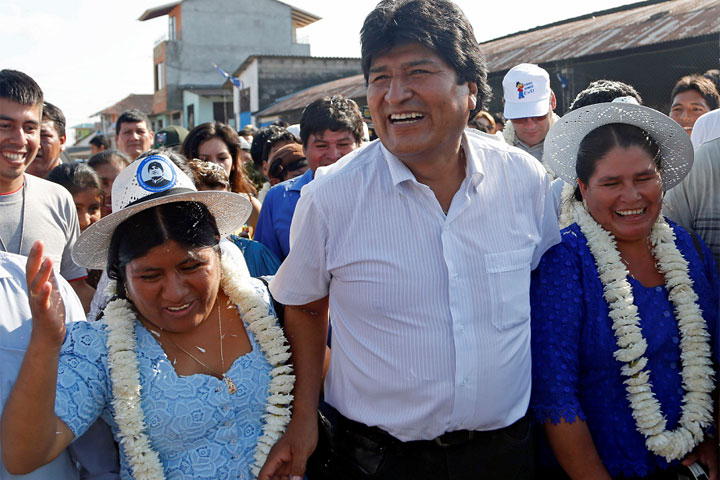
Evo Morales and MAS (Movement Towards Socialism) have won a resounding victory in Bolivia’s general election which was held on 12 October 2014. Morales got 61% of the vote, way ahead of his closest rival, the cement magnate Samuel Medina with 24%. MAS also won 117 out of 130 seats in the Chamber of Deputies, an increase of 13, giving it well over the two-thirds majority it needs to amend the constitution. This is MAS’s third consecutive election victory and it now has majorities in eight of Bolivia’s nine regions, including Santa Cruz, the stronghold of the right wing opposition and the focal point of violent protests by secessionists in 2008.
Achievements
Bolivia’s GDP has tripled since 2005, from $9.5bn to $30bn; its international reserves have risen from $1.7bn to $14.4bn. Critics have tried to dismiss this as the mere result of booming gas prices, but without the renegotiation of contracts with gas multinationals in 2006, the vast majority of the extra gas revenue would have simply left the country.
Public investment grew to $3.78bn in 2013, six times the $629 million in 2005, boosting the domestic economy. This, along with a policy of investing in domestic industry (for example in the processing of gas into derivative products such as liquefied petroleum gas), is what really underlies the performance of the Bolivian economy – 5% growth this year, with an IMF forecast of 5.5% for next year.
Growth has not just benefitted the rich. The monthly minimum wage has increased from 440 bolivianos (about $63) in 2005 to 1200 bolivianos ($173) in 2013. The urban unemployment rate has fallen from 8.1% to 3.2% in 2012, the lowest rate of all of Latin America. Extreme poverty has declined from 38% of the population to 18%. Inequality is down: in 2005 the income of the richest 10% was 128 times more than that of the poorest 10%; by 2012 the ratio was down to 46:1.
Political revolution
As the author Federico Fuentes has pointed out, there has been a political revolution in Bolivia. MAS emerged through years of struggle in the streets, going back to the gas and water wars and beyond (see FRFI No Feb/March 2010) A startling fact of MAS’s second term in government (2009-14) is that it had the highest rate of protests for any government in Bolivian history. Rather than confront them head on, the Morales government has engaged with protestors, building consensus where possible and sometimes retreating. Morales himself calls this approach ‘to govern by obeying’. At the same time the protestors have not questioned the overall direction of the Morales government, whose very existence is a bulwark against the racism and neoliberalism of previous regimes.
Child labour law
Bolivia’s new Child Labour law is an example of this approach. It also illustrates how far Bolivia still has to go in ending poverty. Until now, the legal employment age in Bolivia has been 14. Despite this, there remain an estimated 850,000 child workers in Bolivia. In 2014 the MAS government proposed raising the legal age to 16 years old, but met with mass protests organised by the Union of Child and Adolescent Workers (UNATSBO).
The government worked with UNATSBO to draft a new law that actually lowers the legal age to 10 in ‘exceptional circumstances’. This means that the conditions under which under 14-year-olds work can be regulated for the first time. The new law stipulates that wages and conditions must be the same for children and adults. Children from 10 are only allowed to work if they are self-employed. Above 12, they can work for others if they have the written permission of their parents. Vice President Garcia Linera noted, ‘It would have been easy to pass a law that corresponds to international conventions but it would not have been implemented…[this] law takes as its starting point what we have today and charts out a realistic and viable path for changing the working situation of children.’
Challenges ahead
The vast majority of production remains under private control. In agriculture for example, significant steps were taken to redistribute land but the process has slowed since 2010. Earlier this year a confederation of farmers, rural women, indigenous peoples and intercultural communities called for a new agrarian revolution to combat a renewed land-grab, much of it driven by foreign speculation. This may bring renewed conflict with the landowners in Santa Cruz and other western states.
A further challenge is what will happen in the 2019 presidential election, when Morales will have served three terms and therefore will be required to step down. This is why the two-thirds majority in the National Assembly is important as it gives MAS the option of increasing or removing term limits, bringing Bolivia in line with the majority of countries in the world.
It is clear, however, that the economy and politics of Bolivia are undergoing a profound process of change that benefits the poor and indigenous majority and is pulling hundreds of thousands out of extreme poverty. In that respect it must be supported by socialists everywhere.
Sam Vincent




